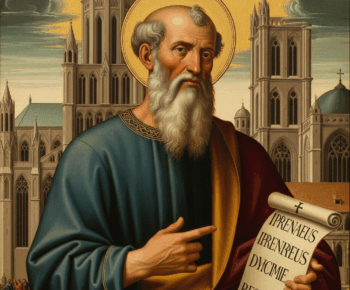
From the earliest centuries of the church, Christians confessed that Jesus Christ did not begin at Bethlehem. He is the eternal Son, the Word who was with the Father from all eternity and who revealed God to His people long before the incarnation. Among the early church fathers, Irenaeus of Lyons (c. AD 130–202) provides some of the clearest testimony to the pre-existence of Christ and His work throughout the Old Testament.
Writing against the Gnostic teachers in Against Heresies, Irenaeus repeatedly affirms that the Son of God is eternal, divine, and active in all of God’s dealings with humanity from the beginning.
The Son Reveals the Father From the Beginning
Irenaeus teaches that every manifestation of God in the Old Testament came through the Son. According to him, the Word was not distant or hidden but continually at work among God’s people:
“The Son of God Himself, who, being always with mankind from the beginning, revealed the Father… All the manifestations of God in the Old Testament were through the Son.”
Against Heresies, IV.20
In other words, Christ did not begin to reveal the Father in the New Testament; He had been doing so “from the beginning.”
The Eternal Pre-Existence of Christ
Irenaeus plainly states that the Son existed with the Father before any created thing:
“The Word existed with the Father before all creation.”
Against Heresies, II.30
And again:
“The Son, eternally with the Father, is Himself God.”
Against Heresies, II.30
For Irenaeus, the Son’s eternal existence is essential to the Christian faith. The Son is not a creature, nor did He come into being at His birth. He is eternally God with the Father.
Christ Appears to the Patriarchs
Irenaeus identifies Christ as the One who appeared to the patriarchs in the Old Testament. The “Angel of the LORD,” who speaks as God and bears the divine name, is understood to be the pre-incarnate Christ.
He writes that the Son was the One who appeared to Abraham, wrestled with Jacob, and spoke in theophanies throughout Scripture. Concerning Moses in particular, he states:
“It was the Son who spoke to Moses in the burning bush, saying, ‘I AM THAT I AM.’”
Against Heresies, III.6
Thus, when the Old Testament saints encountered “the LORD,” they were encountering the Son.
Christ the Creator and Sustainer
Irenaeus continually returns to John 1:1–3 to demonstrate that Christ is the eternal Creator:
“Through His own Word and Wisdom He made all things… the Word, that is, our Lord Jesus Christ.”
Against Heresies, II.22
The Son is not merely a messenger or servant; He is the One through whom the Father brought the world into existence.
Christ’s Role in the Creation of Man
One of Irenaeus’s most striking themes is that the Father created humanity through the Son and the Spirit — often described as God’s “two hands.” Speaking of the creation of Adam, he writes:
“The Word, that is, the Son, and the Wisdom, that is, the Spirit, were always present with Him… by whom He made all things, including man.”
Against Heresies, V.1
This reveals that Christ’s involvement in human history begins not with redemption alone but with creation itself.
Conclusion
Irenaeus’s writings bear unified testimony to a central truth of Christian confession:
Jesus Christ is the eternal Son of God who was active throughout the Old Testament, revealing the Father, giving the law, forming man, sustaining creation, and preparing the way for His incarnation.
For Irenaeus, the Christ of Bethlehem is the same Christ who spoke to Moses, walked with Abraham, and governed all of history long before He took on flesh. His teaching stands as a powerful witness to the church’s ancient and orthodox faith:
the Son is eternal, divine, and unchanging yesterday and today and forever.